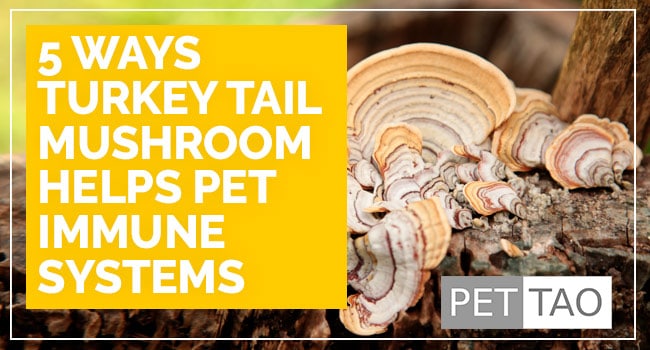Pets with weakened immune systems caused by cancer, infection or inflammation can experience a myriad of health problems.
Traditional veterinarians often recommend Western remedies to treat immunodeficiencies.
Additionally, pets with cancer are often given chemotherapy, which can weaken the immune system.
Western remedies and chemotherapy both often have harsh side effects.
A veterinarian practicing Traditional Chinese Veterinary Medicine (TCVM) may recommend alternative options to strong pharmaceuticals, such as Eastern and Western herbs or supplements.
Providing your pet with a holistic supplement alongside traditional chemotherapy may also prove beneficial.
If your pet has a compromised immune system, he or she may benefit from a mushroom-based supplement.
An increasing number of pet parents see excellent results by administering a supplement with turkey tail mushroom for pet immune systems.
What is Turkey Tail Mushroom?
Turkey tail mushroom, also known as trametes versicolor, is very common in North American woods.
Turkey tail is found on dead hardwood logs and stumps as well as conifer wood.
Other mushrooms, such as shiitake, have gills allowing them to spread spores.
Turkey tail is part of the polypore family because they contain tiny pores to release spores.
The mushroom is named for its colorful stripes resembling the plume of feathers on turkeys.
Documents of Chinese medicine include turkey tail tea dates back to the 15th century during the Ming Dynasty.
In Japan, turkey tail is called kawaritake or “cloud mushrooms.”
The mushroom is so well known for its immune-boosting properties, the cloud-like image symbolizes“longevity and health.”
Why is Turkey Tail Mushroom Beneficial for Improving Pet Immunity?
Turkey Tail contains beta-glucan polysaccharides.
Polysaccharides aid in activating immunity.
1. Research suggests polysaccharides may reduce bacterial infections due to communication with T cells, part of white blood cells fighting off infection.
In one study published in Global Advances in Health and Medicine, an 83-year-old woman diagnosed with advanced, metastatic inflammatory breast cancer was cancer-free after using turkey tail mushroom in combination with continued chemotherapy.
2. Another study in humans showed turkey tails efficacy in treating the human papillomavirus (HPV).
During the study, out of the 61 patients with gum disease who tested positive for HPV, 88 percent of the 41 patients who received both turkey tail and reishi mushrooms showed positive results after two months of treatment.
3. In a study of patients with Kaposi’s sarcoma, skin cancer often affecting those with HIV/AIDS, the use of turkey tail mushroom, in conjunction with other wild medicinal East African mushrooms, proved beneficial.
The patients with HIV/AIDS who didn’t have sarcoma also benefited.
The benefits are a result of turkey tail’s antibacterial and antioxidant properties.
Researchers studied an extract of turkey tail in vitro called PSP, a known antiviral agent, which may prevent the replication of the HIV virus.
4. There are currently two human clinical trials of turkey tail extract approved by the U.S. Food and Drug Administration (FDA).
One study allows patients with advanced prostate cancer to take turkey tail extract with traditional chemotherapy.
Another study will test the effects of turkey tail extract with a vaccine treatment in women with breast cancer.
5. Turkey tail also contains prebiotics, aiding the growth of good bacteria in the body.
Does Turkey Tail Mushroom Have Side Effects?
Safety is not proven in pregnant or lactating animals.
How to Use Turkey Tail Mushroom with Other Herbs and Compounds
Turkey Tail mushroom’s benefits are best when combined with other compounds.
For example, a supplement including Reishi, Shiitake, Turkey Tail, and Maitake mushrooms would most effectively help your pup.
Seeking an all natural supplement to boost your dog’s immune system?








